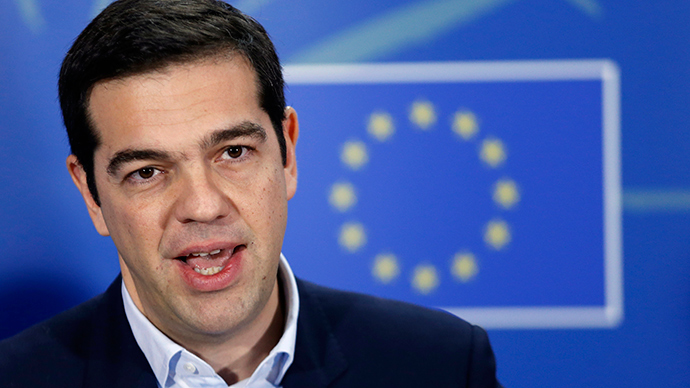'No obstacle': Greece can leave eurozone leaving door open to others

There are no obstacles for Greece’s exit from the eurozone, a member of the Italy’s anti-EU Five Star Movement (M5S), Carlo Sibilia, told RT. He calls Greece “a small laboratory”, an ongoing experiment as more EU states may follow if Greece succeeds.
RT:Greece's new government now wants its foreign debt swapped into growth-linked bonds. Do you think the Greek Prime Minister managed to win the support of his Italian counterpart?
Carlo Sibilia: I think Tsipras is doing a very good job in the first part of his mandate. He is really fighting against privatization of public resources such as the port and energy facilities. He is moving very fine with his minister Varoufakis meeting other prime ministers all over Europe. And I wish he succeeded. But unfortunately I know what Renzi, our Prime Minister, the Italian Prime Minister, is thinking about is Europe. He is not really critical. He is not expressing his criticism towards the European Union. Actually he is still stuck in austerity measures. And I don’t know if in this case Renzi, let’s say, finds an agreement with Tsipras we will see it in the near future. But I really wish Tsipras and Greece could get out of this kind of mess, where the ‘Troika’ and European Commission are taking them to.
RT:Syriza has softened its stance on the Eurozone of late, are you surprised?
CS: I’m not surprised. We are following somehow the Syriza party as well as Podemos in Spain for instance. These are all parties which criticize the European Union and the way it’s been built and what it has become. Because nowadays we think that Europe is just controlled by finance and economic measures. So Europe is not all about money, finance, banks and debt. Maybe the European Union should focus on citizens, the poorness of the citizens, and the people who are unemployed; problems like these should be the focus of the European Union.
RT:Some experts believe Greece's exit from the Eurozone is unavoidable. Do you agree?
CS: Actually, we’ve been studying as the Five Stars movement the possibility to get out of the euro as a monetary union and not as a political union. We’ve been studying this in treaties, like the Lisbon Treaty and Maastricht Treaty. And we haven’t seen any kind of, let’s say controversial part because no one has ever got out of the euro of course. Not yet, at least. So we have no history to recall, but still we think this is possible. If the European Union and the countries which are in the European Union are discussing it within themselves and they really find out that it won’t that good for the citizens as Five Stars wants, this can be done. Because if we see the monetary union is really cracking somehow because of the high risk, high debt and this kind of feeling that banks have to be saved, but citizens have just to pay taxes and interests. I think the near future let’s say is giving a term to the euro, to the monetary union. We should change our currency and see an experiment what is going on next because I think that the European monetary union is just ended.
RT:Your party is viewing an exit from the euro club as a remedy for Italy's financial troubles. Do you think this will work for Greece?
CS: Yes, maybe, for Greece too. I mean Italy and Greece have two different situations of course. Clearly we have higher debt, higher than Greece. But we have a sane economy which has a higher rate of GDP than Greece. And we – Italy - are contributing to the Greece crisis as far as I know because we are funding measures that can somehow help the Greece crisis. So the truth is that I don’t know if the situation is really the same because we really have a great economy which is based on local enterprises, small enterprises and medium enterprises, which really had lots of problems after the starting of the European Union. And we think this fixed exchange with the euro has been a true problem for these small and medium enterprises. Because taxes are higher and for us it’s better to buy goods from the outside of our country. So we are not actually producing anymore, so this means fewer jobs and enterprises, which are the backbone of the Italian economy. So I don’t know exactly the situation with Greece. But as far as I know for us it could be better to get out of the euro. And if Tsipras has this kind of feeling in his country…He has won the election after taking just a small percentage few years ago. I think now Greece and its citizens actually want to get out of this monetary union. And I wish they could find a good situation among the other prime ministers and find a good resolution for this.
RT:If the bailout agreement for Greece is softened, could this provoke an anti-austerity drive among other EU members, such as Spain and Italy?
CS: Yes, I think so and actually I wish so. Because the only movement in Italy which is against these austerity measures which are really cracking our economy and European economies as well… Because even Germany which is doing much better than us in economy for sure doesn’t want a partner which is like a stone to your foot. That’s why if Greece succeeds and Varoufakis and Tsipras succeed to get out of this mess I think somehow this is a kind of ringing a bell for all the other European countries and all the other parties which are against austerity measures. All over Europe these is a kind of feeling that there is something which is not working with the monetary union. And as well as Podemos in Spain and us, the Five Stars movement in Italy and I’m even thinking about Le Pen in France, even if it is too righty I would say… But anyway we collect this kind of feeling among citizens all over Europe. So that’s why I think Greece now is a small laboratory where there is an experiment ongoing and we are really looking at it with great interest. If they succeed in this kind of path they are following, they are trying to discuss with other prime ministers all over Europe, and this will be a ringing bell for other European critics’ parties.
MORE:
The statements, views and opinions expressed in this column are solely those of the author and do not necessarily represent those of RT.
The statements, views and opinions expressed in this column are solely those of the author and do not necessarily represent those of RT.












